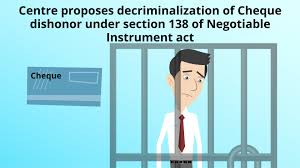

The Negotiable Instruments Act of 1881 defines “Negotiable Instrument” in Section 13. The old French word “negociación,” which denotes interacting with people, trafficking, trade, or business, is the source of the English word “negotiable.” The old French term “instrumentum,” which meaning tool or equipment, is where the word “instrument” originates. A legal document that is freely negotiable, such a bill of exchange or cheque, is called a negotiable instrument. The 142 sections of the Negotiable Instruments Act of 1881 are divided into 17 chapters.
The primary goal of Sections 138 through 142 of the Negotiable Instruments Act of 1881 is to emphasize or support the ability of banking activities to deliver the intended impact under ideal testing conditions. Additionally, the purpose of these parts is to guarantee the legitimacy of business transactions involving cheques and other negotiable instruments.
- The Negotiable Instruments Act of 1881, Section 138
A cheque may be dishonored for a variety of reasons, including insufficient money, a stale or postdated cheque, an altered or irregularly signed cheque, a frozen account, a stop payment instruction, etc. According to Section 138 of the Negotiable Instruments Act, 1881.
When a cheque is drawn by an individual on a specific bank account that he maintains with a banker for the payment of a specific amount to another individual from that bank account for the discharge, in whole or in part, of any amount of debt or other liability that is returned unpaid by the bank, either because the amount of money in the account’s credit is insufficient to cover the amount or because it exceeds the amount that is scheduled to be paid from that account.
As a result, this person or individuals will be considered to have committed an offense and, in addition to any other specified provisions of the Act, will face a maximum sentence of one year in jail, a fine that can go up to twice the amount indicated on the cheque, or both.
Ingredients
The following requirements are listed in Section 138 of the Negotiable Instruments Act, 1881:
- The accused must draw the cheque on a bank account he maintains with a specific banker;
- The amount specified in the cheque must be used to fully or partially discharge the liability; and
- If the cheque is dishonoured, it will be returned unpaid for lack of funds or because the amount exceeds the agreement made with the bank. When a cheque is returned to the holder or drawer unpaid, that is when the crime is considered to have been committed.
Exceptions
- This clause contains an exception in that nothing in it will take effect until either the a. cheque is delivered to the relevant bank within the validity period or, if that is sooner, six months after the date the cheque was drawn from the bank.
- In the course of the cheque, the payee (the person who receives the money) has demanded that the amount be paid by giving notice or in writing to the person who drew the cheque.
- If the drawer neglects to pay the specified amount of money to the appropriate payee or the person who is supposed to receive the money within fifteen days of the receipt of information regarding the notice received. He should do this within fifteen days of the bank providing information regarding the return of the unpaid cheque.
- The Negotiable Instruments Act of 1881, Section 139
According to Section 139 of the Negotiable Instruments Act of 1881, there is an assumption that the holder is entitled to. It discusses the responsibility of a person who wrote a cheque for a specific amount of money and it was returned.
Until and unless such a person establishes his innocence in court, he is deemed guilty. According to this section, there is an assumption that a cheque delivered to settle a debt may be used to settle the debt in full or in part.
It is not enough for the person charged of such an offense to claim that it was supplied as security and escape responsibility. The burden of proof then moves from the respondent to the complainant, who must demonstrate that the cheque was written to satisfy the debt’s obligation if the presumption of culpability is refuted.
- The Negotiable Instruments Act of 1881, Section 142
The Negotiable Instruments Act of 1881 specifies the cognizance of offenses under Section 142.
It specifies that no court may receive notice of any offense that is considered punishable under the terms specified in Section 138 of the Negotiable Instruments Act, 1881, unless the holder of the cheque files a written complaint, regardless of anything stated in CPC, 1973.
- It specifies that any such complaint must be filed following the guidelines in Section 138 of the Negotiable Instruments Act, 1881, and must be submitted within 30 days of the date the action’s cause first appears.
- It further specifies that no court lower than the Metropolitan Magistrate or a first-class judicial magistrate shall try any case involving an offense that is subject to the penalties outlined in Section 138 of the Negotiable Instruments Act of 1881.





